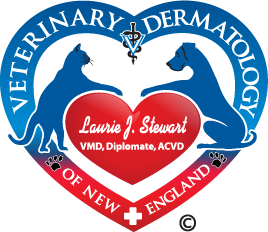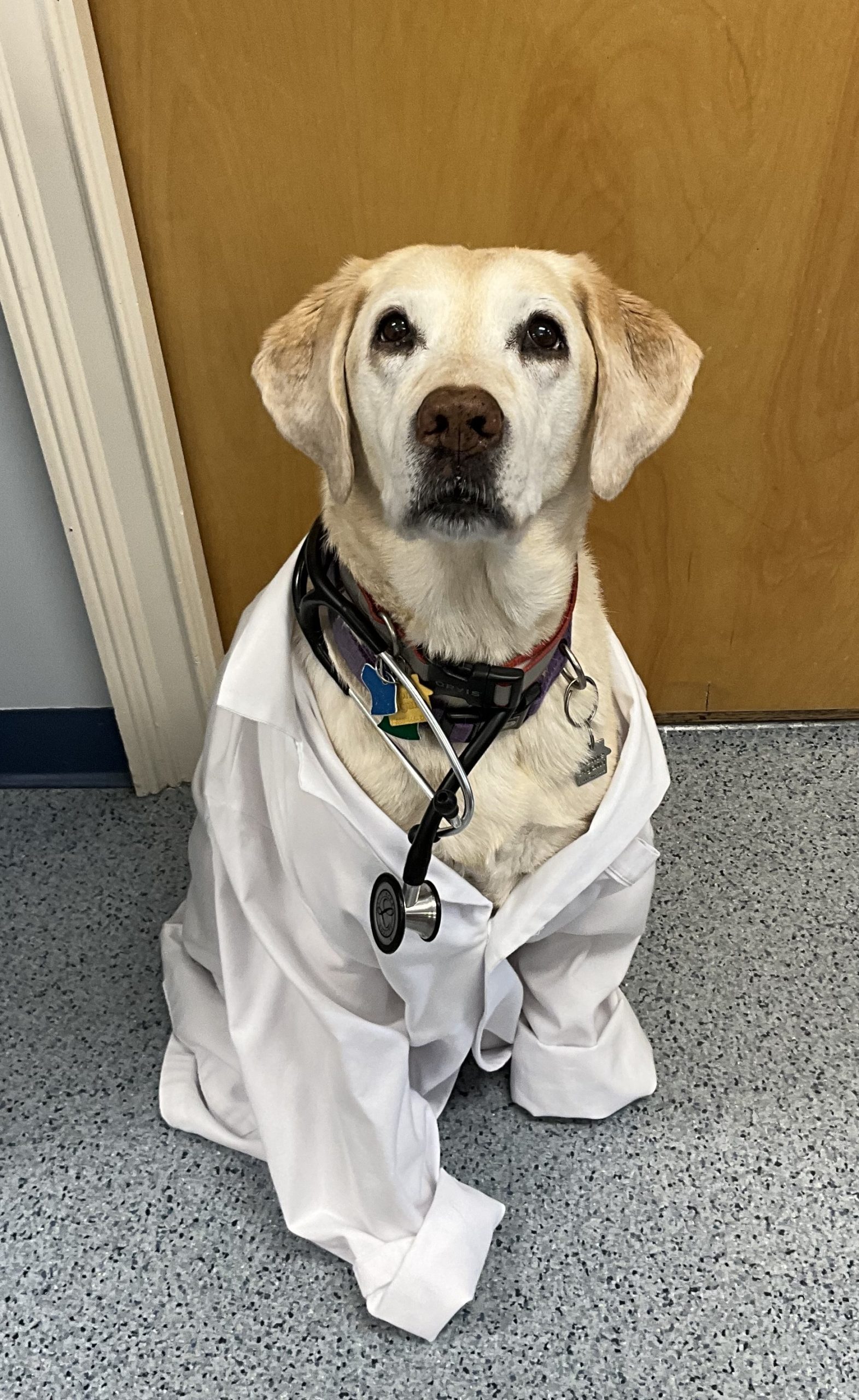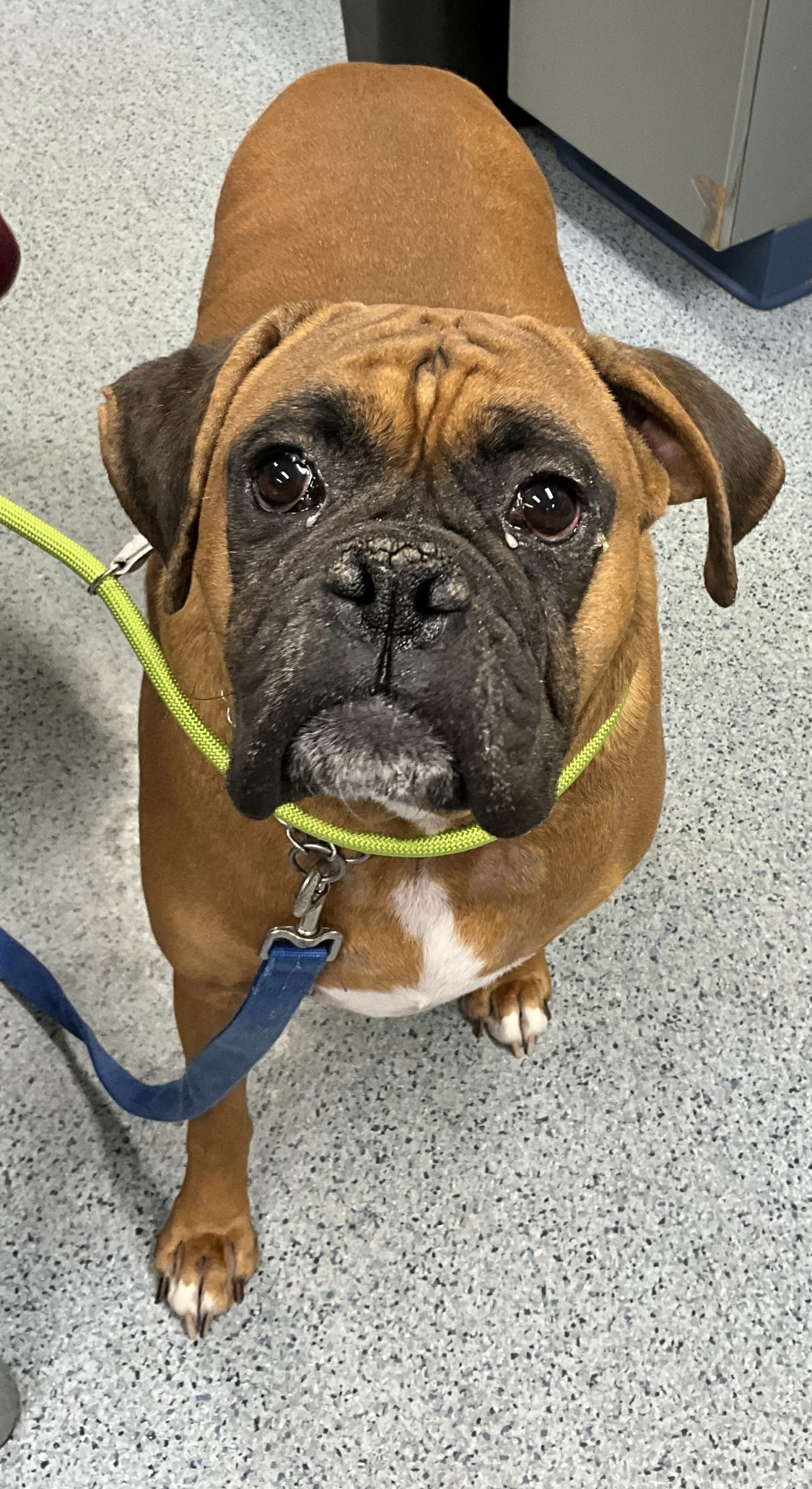Services
We offer a broad range of diagnostic testing and treatments
 Veterinary Dermatology of New England provides comprehensive dermatology services for your pet.
Veterinary Dermatology of New England provides comprehensive dermatology services for your pet.There are hundreds of different skin diseases currently recognized in dogs and cats. Many of these diseases look very much alike, with only subtle differences in the clinical picture and historical backgrounds.
Your pet will be cared for by Board-Certified Dermatologist Dr. Laurie Stewart and her caring staff, who are trained to focus on these differences and pursue a direct and cost-effective diagnostic workup.
We offer a broad range of diagnostic testing and treatments such as:
Cytology of the Ear
 A significant number of pets with skin problems also have unhealthy ears as part of their skin condition. This test determines what is in your pet’s ear on a microscopic (cellular) level. Possible findings include bacteria, white blood cells (pus), yeast, inflammatory cells, excess Cerumen (wax), which can add to inflammation and subsequent damage to the skin of the ear canals and the eardrum. Each condition requires a specific treatment plan. This test determines which medications would be most beneficial for your pet’s ear condition.
A significant number of pets with skin problems also have unhealthy ears as part of their skin condition. This test determines what is in your pet’s ear on a microscopic (cellular) level. Possible findings include bacteria, white blood cells (pus), yeast, inflammatory cells, excess Cerumen (wax), which can add to inflammation and subsequent damage to the skin of the ear canals and the eardrum. Each condition requires a specific treatment plan. This test determines which medications would be most beneficial for your pet’s ear condition.Skin Scraping
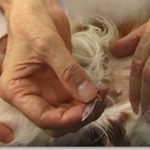 There are several different types of mites that can cause skin problems. Some live naturally in the skin but can overgrow; while others are highly contagious to other pets. A skin scraping will help us determine if any of these mites are involved in your pet’s skin condition.
There are several different types of mites that can cause skin problems. Some live naturally in the skin but can overgrow; while others are highly contagious to other pets. A skin scraping will help us determine if any of these mites are involved in your pet’s skin condition.Fungal Culture
 This test is done to determine if your pet has ringworm. Since ringworm is a contagious fungus to humans and other pets in the household, we want to be sure this is not a factor in your pet’s case.
This test is done to determine if your pet has ringworm. Since ringworm is a contagious fungus to humans and other pets in the household, we want to be sure this is not a factor in your pet’s case.Allergies - Intradermal Skin Test
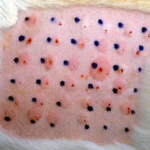 This method of testing for environmental allergies that target a pet’s skin is considered the ‘gold standard’ of allergy testing in veterinary medicine. It can determine to which specific allergens your pet is allergic. Allergens are the environmental agents such as dust mites, grass, weed and tree pollens, and molds that cause an overreaction in an allergic pet. Allergens are inhaled, absorbed across the skin, or, in the case of a parasite allergy, introduced when the host animal is bitten. This method of testing for allergies requires a conscious sedation along with clipping the hair coat in a section on one side of the body. Individual sterile injections are then administered into the upper layers of the skin.
This method of testing for environmental allergies that target a pet’s skin is considered the ‘gold standard’ of allergy testing in veterinary medicine. It can determine to which specific allergens your pet is allergic. Allergens are the environmental agents such as dust mites, grass, weed and tree pollens, and molds that cause an overreaction in an allergic pet. Allergens are inhaled, absorbed across the skin, or, in the case of a parasite allergy, introduced when the host animal is bitten. This method of testing for allergies requires a conscious sedation along with clipping the hair coat in a section on one side of the body. Individual sterile injections are then administered into the upper layers of the skin.Bloodwork
A Complete Blood Count and Chemistry Profile are commonly recommended to check your pet’s overall health, and to check for underlying diseases that may cause or aggravate your pet’s skin condition.
Before starting some medications for the skin, it is important to check a “baseline” of your pet’s bloodwork so we can best monitor therapy and its effects.
It is also important to check your pet’s bloodwork before anesthesia, to ensure normal kidney and liver function, as these organs metabolize anesthetic drugs.
In addition, another blood test called a Thyroid Panel may be recommended, depending on your pet’s condition.
If your pet exhibits symptoms of other hormonal disorders, there are specific hormonal blood tests we may recommend.
Skin Biopsy
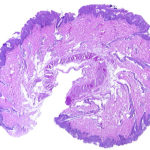 The veterinarian may determine your pet needs a skin biopsy if certain skin disorders are present, or if your pet is not responding to standard therapies. With the pet under general anesthesia, a sample of the tissue will be surgically removed and sent to the laboratory to be examined by a pathologist. This test is used to diagnose or rule out skin cancers along with many other inflammatory, metabolic, or hair loss disorders.
The veterinarian may determine your pet needs a skin biopsy if certain skin disorders are present, or if your pet is not responding to standard therapies. With the pet under general anesthesia, a sample of the tissue will be surgically removed and sent to the laboratory to be examined by a pathologist. This test is used to diagnose or rule out skin cancers along with many other inflammatory, metabolic, or hair loss disorders.Skin Cytology
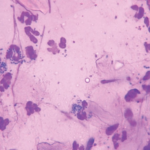 This is a microscopic examination of the material found on the surface of the skin. Similar to the Ear Cytology, this test can be helpful in determining whether bacteria, pus or yeast is complicating your pet’s condition. Each microscopic finding requires a different treatment. The Skin Cytology guides the Dermatologist in prescribing the appropriate shampoos and medications for your pet.
This is a microscopic examination of the material found on the surface of the skin. Similar to the Ear Cytology, this test can be helpful in determining whether bacteria, pus or yeast is complicating your pet’s condition. Each microscopic finding requires a different treatment. The Skin Cytology guides the Dermatologist in prescribing the appropriate shampoos and medications for your pet.
Bacterial Culture and Sensitivity
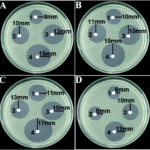 This test determines the exact type of bacteria present and which antibiotic will treat it most effectively. Sites commonly sampled include the ear canal and skin. The samples are then incubated and grown in the lab to determine the particular microbes involved. Individual antibiotics are then tested to determine which are the most effective in treating the organism that your pet harbors.
This test determines the exact type of bacteria present and which antibiotic will treat it most effectively. Sites commonly sampled include the ear canal and skin. The samples are then incubated and grown in the lab to determine the particular microbes involved. Individual antibiotics are then tested to determine which are the most effective in treating the organism that your pet harbors.Trichogram
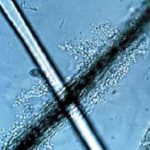 This test is performed by plucking a few hairs from the pet’s coat and performing a microscopic exam. Studying the hairs can identify parasites and be helpful in aiding the clinician with causes of hair loss disorders.
This test is performed by plucking a few hairs from the pet’s coat and performing a microscopic exam. Studying the hairs can identify parasites and be helpful in aiding the clinician with causes of hair loss disorders.Hormonal Tests
 Dermatologic abnormalities are common manifestations of many hormonal conditions. Numerous sensitive tests are available to evaluate for the presence of hormonal disorders. Some of these tests involve multiple blood samples drawn over several hours.
Dermatologic abnormalities are common manifestations of many hormonal conditions. Numerous sensitive tests are available to evaluate for the presence of hormonal disorders. Some of these tests involve multiple blood samples drawn over several hours.Once the diagnostics are completed, Dr. Laurie Stewart will outline a complete treatment plan tailored to your pet’s specific condition. Detailed instructions are provided on how to care for your pet’s particular need.
As a Board-Certified Veterinary Dermatologist, Dr. Laurie Stewart stays current on new studies and treatments.
Please contact us to schedule an appointment.
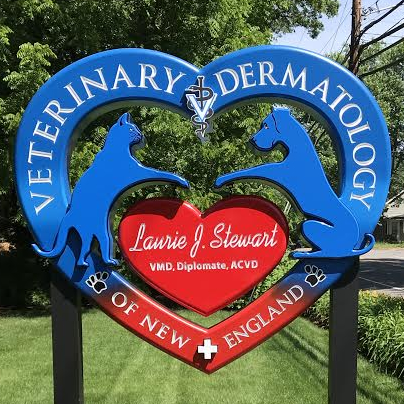
Office Hours

